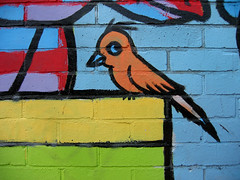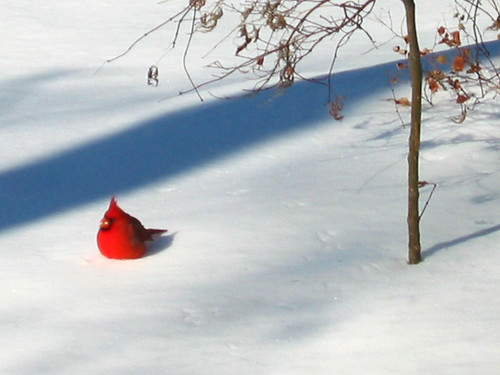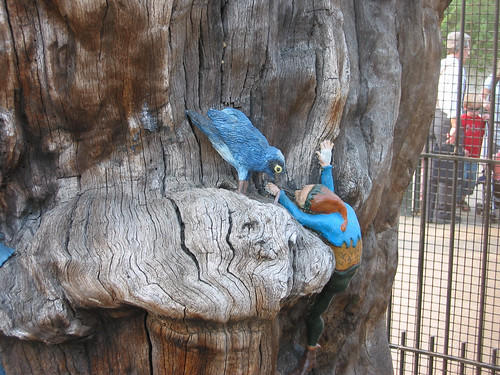
{Photos by rocketlass.}
In honor of the poor, pretty robins I watched flit through the snowfall on Friday, the first day of spring, some wishful thinking.
From Sir Gawain and the Green Knight
Bot thenne the weder of the worlde wyth wynter hit threpes,
Colde clenges adoun, cloudes uplytfen,
Schyre schedes the rayn in schowres ful warme,
Falles upon fayre flat, flowres there schewen.
Bothe groundes and the greves grene at her wedes,
Bryddes busken to bylde, and bremlych syngen
For solace of the softe somer that sues therafter
bi bonk;
And blossumes bolne to blowe
Bi rawes rych and ronk
Then notes noble innoughe
Ar herde in wod so wlonk.

And as translated by Simon Armitage last year:
Then the world's weather wages war on winter:
cold shrinks earthwards and the clouds climb;
sun-warmed, shimmering rain comes showering
onto meadows and fields where flowers unfurl;
woods and grounds wear a wardrobe of green;
birds burble with life and build busily
as summer spreads, settling on slopes as
it should.
Now every hedgerow brims
with blossom and with bud,
and lively songbirds sing
from lovely, leafy woods.

The reality, sadly--more sadly for the robins, the misguided swallows who've already returned, and all the other bryddes than for me and my cats, comfortable in our house--has in recent days been more like this:
But wild-looking weather was about in the world:Though Armitage's translation is very good--vivid and visual, with rich alliteration--I'll also include the Middle English once more, just for the pleasurable sound of it and the occasional cognate that can serve as a guidepost:
clouds decanted their cold rain earthwards;
the nithering north needled man's very nature;
creatures were scattered by the stinging sleet.
Then a whip-cracking wind comes whistling between hills
driving snow into deepening drifts in the dales.
Bot wylde wederes of the worlde wakned theroute,But the snaw is no longer snitering ful snart, and even the cloudes are beginning to uplyft. Maybe we'll have some spring one of these days after all.
Clowdes kesten kenly the colde to the erthe,
Wyth nyye innoughe of the northe, the naked to tene.
The snaw snitered ful snart, that snayped the wylde;
The werbelande wynde wapped fro the hyghe
And drof uche dale ful of dryftes ful grete.

Just wanted to say that I enjoy your blog and found this post particularly charming in its whimsical appreciation of middle english poetry - thanks.
ReplyDeleteThanks for the kind words, Oliver.
ReplyDeleteMy reading knowledge of Middle English is spottier than I'd like: good enough to muddle through, but not to feel natural or easy. And I have to check the notes on any Middle English I read a lot. But oh, the sound of it when read aloud--there's little better.